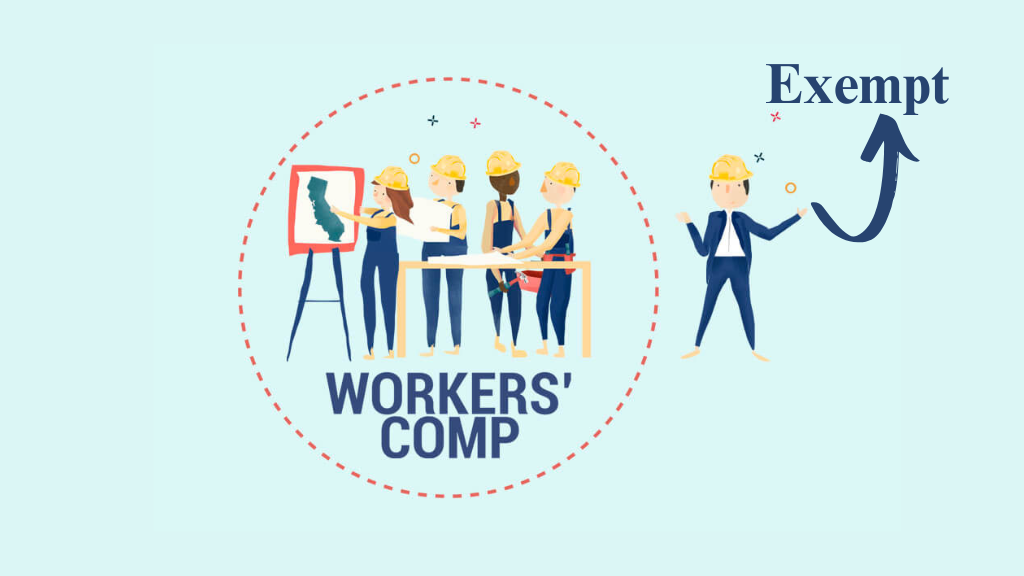Hugh Pham | Insurance Agency Principal
When Is Workers Compensation Not Required for Employees in California?
See How We're Different
or call us: 866-226-4436
Workers' Compensation insurance is a form of coverage that provides wage replacement and medical benefits to employees injured in the course of employment. It is a trade-off between employers and employees where the workers relinquish their right to sue their employers for negligence in return for compensation provided irrespective of fault. This concept is designed to ensure that workers who suffer workplace injuries or illnesses are provided with medical care, lost wages, and, if necessary, ongoing disability care or death benefits.
When Worker's Compensation is Not Required in California
The California Workers' Compensation Act stipulates that all employers, regardless of size, must have Workers' Compensation insurance for their employees. However, there are some cases where Workers' Compensation is not mandated.
Division 4, Part 1, Chapter 2, Section 3352 of the California Labor Code lists out workers who are exempt from Workers' Compensation coverage. They include:
- Sole proprietors and entrepreneurs/Individuals operating their own businesses (excluding roofing professionals)
- Self-employed contractors such as gig workers
- Individuals compensated with food and shelter rather than wages for their work
- Volunteers, including those who contribute to nonprofits
- Domestic workers who are family members of their employers
- Officials of amateur sports and students involved in amateur sports activities
- Deputy sheriffs and deputy clerks
It's important to note that these exceptions are not loopholes or means to evade the responsibility of providing Workers' Compensation, but specific scenarios outlined within the framework of the law.
Definition of an Employee
A worker is considered an employee if they are under the direct control of the employer. California's Workers' Compensation Act identifies four elements that must be present for a relationship to be considered an employment-related one:
- The person performing services must be free from the control and direction of the hiring entity in connection with the performance of the work, both under the contract for the performance of such service and in fact.
- The individual must be engaged in an independently established trade, occupation or business of the same nature as that involved in performing the services contracted for.
- The hiring entity must not have a right to control or direct the manner and means by which results are achieved.
- The service must be performed outside the usual course of business of the hiring entity.
The California Supreme Court held that, in determining whether a worker is an employee or an independent contractor, it is important to focus on the extent of control and direction over the manner in which a worker performs his or her job duties. In short, if the hiring entity has significant authority over how a worker performs his or her job duties, then it can be said that the worker is an employee.
Additionally, California law identifies a few other individuals who may be considered employees for Workers' Compensation purposes even if they do not fit within the traditional employer-employee relationship:
- Domestic workers and child care providers
- Certain agricultural workers
- Volunteers and interns in certain circumstances
- Learners, apprentices, disabled veterans, and students performing services for educational purposes
It is important to note that an employer's failure to procure Workers' Compensation coverage for its employees can result in penalties.
Independent Contractors: Misclassification and Insurance Coverage
Misclassification occurs when an employer incorrectly defines a worker’s status, typically identifying the individual as an independent contractor rather than an employee. This error, sometimes intentional, can have serious implications. Employers may do this to avoid responsibilities like paying taxes, providing worker's compensation, or fulfilling other legal obligations that come with employee status. It's significant for workers to understand their status since misclassification can deprive them of their legal rights and benefits, such as overtime pay and protection under labor laws.
In any case,
gig workers are not entitled to the same coverage and protections as employees.
Self-Employed Individuals
Self-employed individuals are workers who are not employed by a company or organization but conduct business independently. They are responsible for their own
health insurance coverage and other benefits, such as disability and unemployment. Self-employed individuals can purchase coverage through the Affordable Care Act’s Health Insurance Marketplace, or they may opt to participate in group health plans offered by associations or trade organizations.
Executive Officers and General Partners
Executive officers or general partners of a company may be considered self-employed, even if they hold an employment status. As such, they are subject to the same coverage requirements as self-employed individuals. In addition, these workers may be eligible for certain tax deductions associated with their business activities.
Roofing Professionals
Roof professionals are not exempt from coverage requirements due to the high-risk nature of their work. According to the
U.S. Department of Labor, roofing work is classified as one of the most dangerous occupations. These professionals are exposed to hazards such as falls from heights, burns from hot bitumen, and injuries from power tools. Due to the high incident rate of occupational injuries and fatalities, it is crucial that these individuals have access to comprehensive health coverage and workers' compensation. The aim is to ensure that they are protected in case of work-related accidents and illnesses.
Potential Risks and Consequences of Not Providing Worker's Compensation in California
There are various legal and financial repercussions of not providing workers' compensation in California, both for the employee and the employer:
Legal Implications
- Non-compliance with worker's compensation laws can incur severe legal consequences, such as fines or imprisonment. In California, employers can face a penalty of up to $10,000 or imprisonment in county jail for up to one year, or both.
- Employers may be subject to lawsuits from injured workers. Without workers' compensation insurance, employers lose certain legal protections, including immunity from most types of personal injury lawsuits by employees.
Financial Repercussions
- Financial penalties for failing to provide workers' compensation insurance are considerable. California's Uninsured Employers' Fund can impose a penalty of up to $100,000 against illegally uninsured employers.
- If an employee is injured on the job, the employer is responsible for paying all medical bills directly out-of-pocket. This can include initial emergency room visits, ongoing medical treatment, physical therapy, and any necessary surgeries or medical procedures.
- Additionally, employers can also be held liable for lost wages and benefits, which can quickly add up and cause a significant financial strain on a business.
The potential penalties, coupled with the ethical responsibility of ensuring worker safety, make compliance with workers' compensation laws a sound business decision.
Opting Out Of Worker's Compensation Insurance - The Pros, Cons, and Process
There can be instances where it may seem beneficial for businesses, especially small businesses, to opt out of workers' compensation insurance. For example, when they have few employees who rarely engage in high-risk activities. Some businesses might also opt-out to cut costs, especially if they offer other forms of health insurance.
However, opting out of workers' compensation insurance comes with its own set of implications. Without this insurance, businesses are exposed to potential lawsuits from injured employees, which can result in costs that far exceed the workers' compensation insurance premiums.
Employees, too, can opt out through a waiver, which releases the employer from the obligation to pay workers' compensation benefits. However, in doing so, they forfeit their right to compensation should they be injured at work.
The process to opt out of workers' compensation insurance varies by state. In California, for instance, employers seeking to opt out need to complete a Workers' Compensation Exemption form, which requires detailed information about the business and its workers. Employers should consult with a legal or insurance professional before making any decisions regarding workers' compensation insurance.
Alternatives To Worker's Compensation Insurance
While workers' compensation insurance is a standard approach to safeguarding employees, several alternatives can also serve to protect both the worker and the employer. Some of these alternatives include:
Occupational Accident Insurance: This form of insurance typically covers medical expenses and lost wages resulting from an occupational accident. While similar to workers' compensation, it usually doesn't provide as comprehensive coverage.
Employer's Liability Insurance: This insurance can help protect businesses from the financial impact of potential lawsuits filed by employees who suffer a work-related injury or illness.
Private Disability Insurance: Private disability insurance can serve as a back-up plan, providing income to those who become disabled and are unable to work.
Safety and Health Investments: Employers may also invest more in safety measures and employee health programs to reduce the risk of workplace injuries and illnesses.
Need Further Assistance? Talk to A California Worker's Compensation Expert!
Navigating the complexities of workers' compensation insurance can be a daunting task, especially for small businesses. That's why it is often best to partner with an experienced insurance provider to guide you through your options and ensure that you get the right coverage for your business.
At Western Insurance Marketing (WIM), we have over 4 decades of experience in helping our clients find solutions tailored to their unique needs. Our team of experts is always available to answer any questions you may have and advise you on the best course of action for your business's workers' compensation insurance.
Don't wait – contact us today to learn more about our comprehensive suite of insurance products and services! We look forward to helping you get the coverage you need.
Recent News










Western Insurance
Marketing Corporation
Since 1963, Western Insurance Marketing Corporation, an independent insurance agency, has offered coverage clients require with the power of choice from top-rated national and regional insurance carriers.
9340 Bolsa Ave, Westminster, CA 92683
CA License #: 0548614
We are licensed in all 50 states, AZ, CA, CO, NM, NV, OR, TX, and WA.
All Rights Reserved | Western Insurance Marketing Corp. | Privacy Policy | Legal Disclaimer


